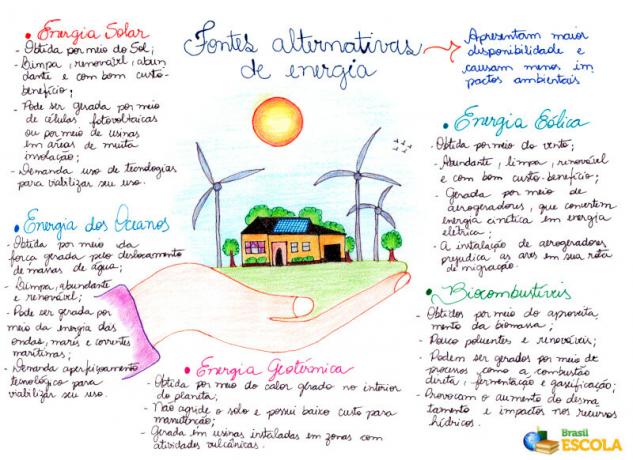Nuclear energy, also called atomic, is obtained from the fission of the nucleus of the enriched uranium atom, releasing a large amount of energy. Nuclear energy holds the particles in the nucleus of an atom together. Dividing this nucleus into two parts causes the release of large amounts of energy.
The first results of atom splitting of heavy metals such as uranium and plutonium were obtained in 1938. At first, the energy released by nuclear fission was used for military purposes. Subsequently, research advanced and were developed with the aim of producing electricity. However, nuclear weapons continue to be produced through the enrichment of uranium.
Currently, the United States leads the production of nuclear energy, but the countries most dependent on nuclear energy are France, Sweden, Finland and Belgium. In France, around 80% of its electricity comes from nuclear power stations.
In the late 1960s, the Brazilian government began to develop the Brazilian Nuclear Program, aimed at implementing the production of atomic energy in the country. The country has the Almirante Álvaro Alberto nuclear power plant, made up of three units (Angra 1, Angra 2, and Angra 3). It is located in the municipality of Angra dos Reis, in the state of Rio de Janeiro. Currently, only Angra 2 is in operation.
This energy source is responsible for a lot of controversy and mistrust: the lack of security, the disposal of nuclear waste, in addition to possibility of accidents happening in the plants, generate the disapproval of the use of nuclear energy by a large part of the population. Some accidents in nuclear power plants have already happened, among them are:
Three Miles Island – in 1979, at the plant located in Pennsylvania (USA), the reactor core melted and released high levels of radioactivity that reached neighboring regions.
Chernobyl – in 1986 there was a fire and a radiation leak in the Ukrainian plant, in the extinct Soviet Union, with thousands of injured and dead, and radioactive contamination may have caused 1 million cases of cancer in 20 years following.
Nuclear energy has several positive aspects, being of fundamental importance in countries that do not have natural resources for obtaining energy. More in-depth studies must be carried out on this energy source, there are still several points to be improved, so that they can guarantee safety for the population.
Positive aspects of nuclear energy:
- Nuclear energy reserves are much larger than fossil fuel reserves;
- Compared to fossil fuel plants, the nuclear plant requires smaller areas;
- Nuclear power plants enable greater energy independence for oil and gas importing countries;
- Does not contribute to the greenhouse effect.
Negative aspects:
- The construction and operation costs of the plants are very high;
- Possibility of building nuclear weapons;
- Disposal of atomic waste;
- Accidents that result in the release of radioactive material;
- Plutonium 239 takes 24,000 years to have its radioactivity halved, and about 50,000 years to become innocuous.
Do not stop now... There's more after the advertising ;)
By Wagner de Cerqueira and Francisco
Graduated in Geography
Would you like to reference this text in a school or academic work? Look:
FRANCISCO, Wagner de Cerqueira and. "Nuclear energy"; Brazil School. Available in: https://brasilescola.uol.com.br/geografia/energia-nuclear.htm. Accessed on June 27, 2021.
geography

Learn a little more about solar energy, an energy source from the sun capable of generating electricity through thermal and photovoltaic use. The following text will address the functioning of this form of energy, its types, use, advantages and disadvantages.


